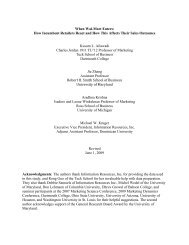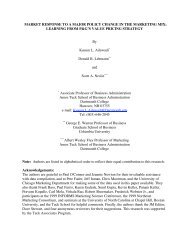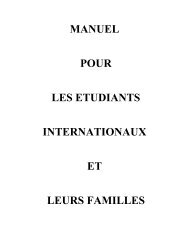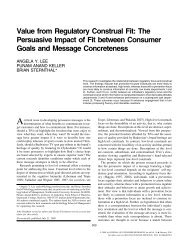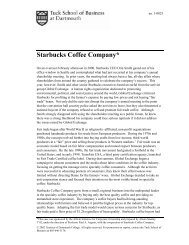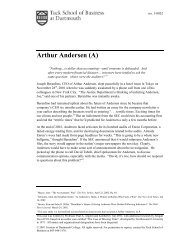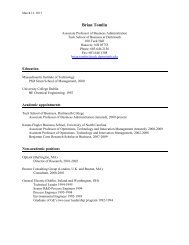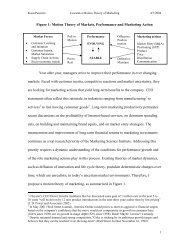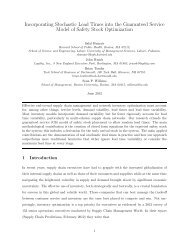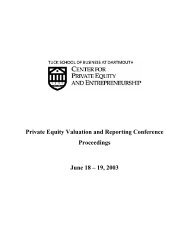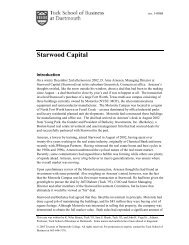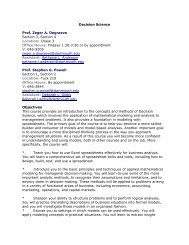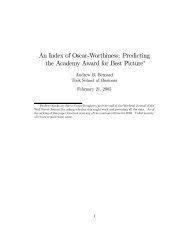tax notes international - Tuck School of Business - Dartmouth College
tax notes international - Tuck School of Business - Dartmouth College
tax notes international - Tuck School of Business - Dartmouth College
You also want an ePaper? Increase the reach of your titles
YUMPU automatically turns print PDFs into web optimized ePapers that Google loves.
PRACTITIONERS’ CORNER<br />
for German schools within the EEA, the practice <strong>of</strong><br />
the German <strong>tax</strong> authorities disallowing a <strong>tax</strong> deduction<br />
for school fees for private schools located outside Germany<br />
but within the EEA is not compatible with EC<br />
law, in particular with the freedom <strong>of</strong> services and freedom<br />
<strong>of</strong> movement principles in articles 49 and 18 <strong>of</strong><br />
the EC Treaty (Schwarz/Gootjes-Schwarz (Case C-76/<br />
05)).<br />
The ECJ concluded that the German rule constitutes<br />
an obstacle to the freedom to provide services<br />
because it dissuades German residents from sending<br />
their children to private schools established in another<br />
member state and impedes private schools established<br />
in other member states from <strong>of</strong>fering education to the<br />
children <strong>of</strong> German residents. The German rule generally<br />
results in a higher <strong>tax</strong> burden for <strong>tax</strong>payers who<br />
sent their children to a private school located in another<br />
EU member state because the school fees would<br />
not be deductible. Finally, the ECJ ruled that the German<br />
provision violates the free movement <strong>of</strong> citizens<br />
because it places the <strong>tax</strong>payers who have children attending<br />
schools in another member state at an unjustifiable<br />
disadvantage compared with persons who have<br />
not exercised that right.<br />
Consequences <strong>of</strong> the ECJ Decision<br />
Based on the ECJ decision, the Finance Court <strong>of</strong><br />
Cologne ruled on February 14, 2008, that the fees paid<br />
by the <strong>tax</strong>payers to the school in Scotland had to be<br />
treated as special expenses on the <strong>tax</strong>payer’s German<br />
income <strong>tax</strong> return. However, the fiscal court granted<br />
leave to the German <strong>tax</strong> authorities to appeal to the<br />
German Federal Finance Court to obtain further clarification<br />
on the impact on domestic <strong>tax</strong> law if EU law<br />
is violated (for example, because <strong>of</strong> pro<strong>of</strong> required by<br />
the <strong>tax</strong> authorities related to requirement 3 above). The<br />
<strong>tax</strong> authorities filed an appeal in April 2008, and the<br />
outcome is still pending.<br />
Following the ECJ’s decision, the German <strong>tax</strong> authorities<br />
generally intend to consider fees paid to<br />
schools within the EU/EEA as special expenses for<br />
German income <strong>tax</strong> purposes. The <strong>tax</strong> authorities require,<br />
however, that the foreign school leads to a<br />
graduation approved by the Conference <strong>of</strong> Cultural<br />
Ministers <strong>of</strong> the German Federal States or the Ministry<br />
<strong>of</strong> Culture <strong>of</strong> a German federal state. Also, the German<br />
<strong>tax</strong> resident claiming the <strong>tax</strong> deduction must provide<br />
the <strong>tax</strong> authorities with confirmation from the foreign<br />
school that access to the school is not limited to<br />
students who can afford to pay the school fees (that is,<br />
for purposes <strong>of</strong> meeting requirement 3 above), but that<br />
students with limited financial funds also can attend<br />
the school (for example, through scholarships).<br />
Should the school fees not be taken into account in<br />
a German income <strong>tax</strong> assessment notice (for example,<br />
the <strong>tax</strong>payer could not provide the requested pro<strong>of</strong> because<br />
the school had not forwarded necessary documents),<br />
the <strong>tax</strong>payer should file an objection and request<br />
a postponement <strong>of</strong> the final assessment until the<br />
Federal Finance Court issues its decision in the case.<br />
2009 Tax Act<br />
The lower house <strong>of</strong> the German Parliament (Bundestag)<br />
on November 28, 2008, approved the 2009 annual<br />
Tax Act (Jahressteuergesetz 2009), and the upper house<br />
(Bundesrat) approved it on December 19, 2008. The<br />
Tax Act provides that school fees for private non-<br />
German schools in the EU/EEA whose graduation is<br />
approved by the German authorities will be treated as<br />
special expenses. While the act maintains the 30 percent<br />
deduction level for school fees, the deduction will<br />
be capped at €5,000. The new rule is retroactive from<br />
January 1, 2008, and for all prior-year cases for which<br />
a relevant income <strong>tax</strong> assessment notice has not become<br />
final. ◆<br />
420 • FEBRUARY 2, 2009 TAX NOTES INTERNATIONAL<br />
(C) Tax Analysts 2009. All rights reserved. Tax Analysts does not claim copyright in any public domain or third party content.



